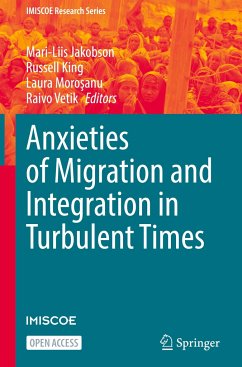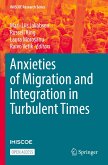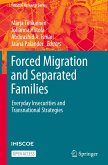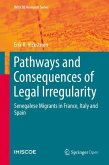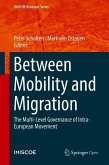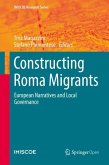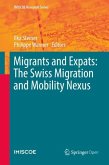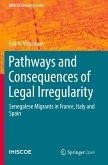Anxieties of Migration and Integration in Turbulent Times
Herausgegeben:Jakobson, Mari-Liis; King, Russell; Morosanu, Laura; Vetik, Raivo
Anxieties of Migration and Integration in Turbulent Times
Herausgegeben:Jakobson, Mari-Liis; King, Russell; Morosanu, Laura; Vetik, Raivo
- Gebundenes Buch
- Merkliste
- Auf die Merkliste
- Bewerten Bewerten
- Teilen
- Produkt teilen
- Produkterinnerung
- Produkterinnerung
How do migration and integration change when 'crisis becomes normalcy'? This open access book investigates this question in the present context of turbulent times when, instead of dealing with one crisis, migrants, governments and whole societies have to cope within a complex web of multiple unsettling events that create anxieties about migration. Emphasising a plurality of theoretical perspectives and methodological approaches, as well as a variety of geographical settings in Europe and beyond, the chapters bring new insights into migrations produced by global political events, national…mehr
Andere Kunden interessierten sich auch für
![Anxieties of Migration and Integration in Turbulent Times Anxieties of Migration and Integration in Turbulent Times]() Anxieties of Migration and Integration in Turbulent Times30,99 €
Anxieties of Migration and Integration in Turbulent Times30,99 €![Forced Migration and Separated Families Forced Migration and Separated Families]() Forced Migration and Separated Families38,99 €
Forced Migration and Separated Families38,99 €![Pathways and Consequences of Legal Irregularity Pathways and Consequences of Legal Irregularity]() Erik R. VickstromPathways and Consequences of Legal Irregularity38,99 €
Erik R. VickstromPathways and Consequences of Legal Irregularity38,99 €![Between Mobility and Migration Between Mobility and Migration]() Between Mobility and Migration38,99 €
Between Mobility and Migration38,99 €![Constructing Roma Migrants Constructing Roma Migrants]() Constructing Roma Migrants38,99 €
Constructing Roma Migrants38,99 €![Migrants and Expats: The Swiss Migration and Mobility Nexus Migrants and Expats: The Swiss Migration and Mobility Nexus]() Migrants and Expats: The Swiss Migration and Mobility Nexus38,99 €
Migrants and Expats: The Swiss Migration and Mobility Nexus38,99 €![Pathways and Consequences of Legal Irregularity Pathways and Consequences of Legal Irregularity]() Erik R. VickstromPathways and Consequences of Legal Irregularity38,99 €
Erik R. VickstromPathways and Consequences of Legal Irregularity38,99 €-
-
-
How do migration and integration change when 'crisis becomes normalcy'? This open access book investigates this question in the present context of turbulent times when, instead of dealing with one crisis, migrants, governments and whole societies have to cope within a complex web of multiple unsettling events that create anxieties about migration. Emphasising a plurality of theoretical perspectives and methodological approaches, as well as a variety of geographical settings in Europe and beyond, the chapters bring new insights into migrations produced by global political events, national political shifts, economic downturns and the Covid-19 pandemic. Special attention is given to both migrants' experiences and policy outcomes. The result is an impressive rethinking of the concepts and terminology applied to migration and integration, of interest to students, social scientists, and policy-makers.
Produktdetails
- Produktdetails
- IMISCOE Research Series
- Verlag: IMISCOE / Springer / Springer International Publishing / Springer, Berlin
- Artikelnr. des Verlages: 978-3-031-23995-3
- 1st ed. 2023
- Seitenzahl: 268
- Erscheinungstermin: 14. Februar 2023
- Englisch
- Abmessung: 241mm x 160mm x 21mm
- Gewicht: 571g
- ISBN-13: 9783031239953
- ISBN-10: 3031239954
- Artikelnr.: 66452428
- Herstellerkennzeichnung
- Springer Nature c/o IBS
- Benzstrasse 21
- 48619 Heek
- Tanja.Keller@springer.com
- IMISCOE Research Series
- Verlag: IMISCOE / Springer / Springer International Publishing / Springer, Berlin
- Artikelnr. des Verlages: 978-3-031-23995-3
- 1st ed. 2023
- Seitenzahl: 268
- Erscheinungstermin: 14. Februar 2023
- Englisch
- Abmessung: 241mm x 160mm x 21mm
- Gewicht: 571g
- ISBN-13: 9783031239953
- ISBN-10: 3031239954
- Artikelnr.: 66452428
- Herstellerkennzeichnung
- Springer Nature c/o IBS
- Benzstrasse 21
- 48619 Heek
- Tanja.Keller@springer.com
Mari-Liis Jakobson is Associate Professor of Political Sociology at Tallinn University, Estonia. Her research interests relate to the politics of migration and citizenship. In 2014, she defended her PhD, Citizenship in Transformation: Political Agency in the Context of Migrant Transnationalism. She has served as a Visiting Fellow at the School of Slavonic and East European Studies (SSEES) at University College London, UK (2014) and as the Juris Padegs Research Fellow at the Yale MacMillan Center, Yale University, USA (2019-2020). In 2016-19, she worked as a researcher for the Estonian national contact point of the European Migration Network and, since 2018, has served as a country expert for the Global Citizenship Observatory GLOBALCIT and as a member of various national working groups on migration and transnationalism policy. Russell King is Professor of Geography at the University of Sussex and Visiting Professor in Migration Studies at Malmö University. At Sussex he was the founding director of the Sussex Centre for Migration Research, and edited the Journal of Ethnic and Migration Studies from 2001 to 2013. He has a forty-year experience of researching and writing about migration, including thematic specialisms in return migration, international retirement migration, student and youth mobilities, and migration and development. His regional interests are primarily in Europe, especially Southern Europe and the Western Balkans. He has been involved in several large-scale European projects on migration, including heading the Sussex involvement in MIRNet, upon which this book is based. Laura Moröanu is Senior Lecturer in Sociology at the University of Sussex, UK, where she is a member of the Sussex Centre for Migration Research and Associate Editor of the Journal of Ethnic and Migration Studies. Her research interests include migrant networks, identities, and work trajectories, which she has explored in the context of intra-European migration. Laura has published in prominent sociology and migration journals, and recently co-authored the book Young EU Migrants in London in the Transition to Brexit (with Aija Lulle and Russell King). As well as her involvement in MIRNet, the Horizon 2020 Migration Network, she has been co-investigator in two other major European projects under the H2020 programme: 'YMOBILITY', on youth mobilities in Europe, 2015-18; and 'TRAFIG', on transnational figurations of displacement, 2019-22. Raivo Vetik is Professor of Comparative Politics at Tallinn University, Estonia, since 2001, and is the overall co-ordinator of the MIRNet consortium. He earned his first PhD, from the Latvian Academy of Sciences, in Political Philosophy in 1989 and a second PhD in Political Science from Tampere University in Finland in 1999. During the period 1998-2008 he served as Director of the Institute of International and Social Studies at Tallinn University. Raivo has been five times editor-in-chief of the Estonian Human Development Reports in the years 1999-2015 and was the founding editor of the journal Studies in Transition States and Societies. Since 1998 he has frequently served as a consultant to the Estonian government on issues relating to immigrant integration and he headed a research group compiling integration monitors of Estonian society, commissioned by the Estonian Ministry of Culture. Raivo has led or participated in numerous EU research projects under FP4, FP5 and FP6 devoted to migration and integration issues, including the highly successful 'TIES' project, The Integration of the European Second Generation.
1. Migration and Integration in Turbulent Times (Mari-Liis Jakobson, Russell King, Laura Morosanu, Raivo Vetik).- Part 1. Migrants' Perspectives.- 2. Dis-Embedding or Re-Embedding? Exploring Migrants' Responses in Contexts of 'Unsettling Events' (Louise Ryan).- 3. Migration Strategies at the Time of a Crisis: Asylum Applicants in Finland (Joni Virkkunen, Saara Koikkalainen, Minna Piipponen).- 4. Adapting to the New Normality: The Impact of the Covid-19 Pandemic on Seasonal Migration from Albania (Bresena Kopliku, Erka Çaro).- 5. Left to Their Own Devices: Refugees' Labour-Market Integration Challenges in Austria During the Covid-19 Pandemic (Petra Aigner, Almina Besic).- 6. LGBTQ+ Forced Migrants: Precarious Experiences of Arrival and Settlement in Wales (Ourania Vamvaka-Tatsi).- 7. Disrupted Mobilities: British-Bangladeshis Visiting their Friends and Relatives during the Global Pandemic (Md Farid Miah).- Part 2. Perspectives from Host Societies.- 8. Different Systems, Similar Responses: Policy Reforms on Asylum-Seekers' and Refugees' Access to Healthcare in Germany and Sweden in the Wake of the 2015-17 'Migration Crisis' (Mechthild Roos).- 9. The Assimilationist Drift of Italian Jurisprudence on Integration in the Years of the 'Refugee Crisis' (Giovanni Cavaggion).- 10. Covid-19 and the Politics of Migration Policy in Estonia (Leif Kalev).- 11. Immigrants as the 'Antagonists'? Populism, Negative Emotions and Anti-Immigrant Attitudes in Ecuador (Sebastián Umpierrez de Reguero, Santiago González-Paredes, Ingrid Ríos Rivera).- 12. The Mediatisation of Migration Issues during the 'Refugee Crisis': A Comparative Case-Study of the UK, Denmark and Germany (Sevgi Temizisler).- 13. Who is the Worst Migrant? Migrant Hierarchies in Populist Radical-Right Rhetoric in Estonia (Katrina Koppel, Mari-Liis Jakobson).- 14. Migration and (De)Securitisation Dynamics at the Local Level: Discourses and Practices in South Tyrol (Andrea Carlà).
1. Migration and Integration in Turbulent Times (Mari-Liis Jakobson, Russell King, Laura Morosanu, Raivo Vetik).- Part 1. Migrants' Perspectives.- 2. Dis-Embedding or Re-Embedding? Exploring Migrants' Responses in Contexts of 'Unsettling Events' (Louise Ryan).- 3. Migration Strategies at the Time of a Crisis: Asylum Applicants in Finland (Joni Virkkunen, Saara Koikkalainen, Minna Piipponen).- 4. Adapting to the New Normality: The Impact of the Covid-19 Pandemic on Seasonal Migration from Albania (Bresena Kopliku, Erka Çaro).- 5. Left to Their Own Devices: Refugees' Labour-Market Integration Challenges in Austria During the Covid-19 Pandemic (Petra Aigner, Almina Besic).- 6. LGBTQ+ Forced Migrants: Precarious Experiences of Arrival and Settlement in Wales (Ourania Vamvaka-Tatsi).- 7. Disrupted Mobilities: British-Bangladeshis Visiting their Friends and Relatives during the Global Pandemic (Md Farid Miah).- Part 2. Perspectives from Host Societies.- 8. Different Systems, Similar Responses: Policy Reforms on Asylum-Seekers' and Refugees' Access to Healthcare in Germany and Sweden in the Wake of the 2015-17 'Migration Crisis' (Mechthild Roos).- 9. The Assimilationist Drift of Italian Jurisprudence on Integration in the Years of the 'Refugee Crisis' (Giovanni Cavaggion).- 10. Covid-19 and the Politics of Migration Policy in Estonia (Leif Kalev).- 11. Immigrants as the 'Antagonists'? Populism, Negative Emotions and Anti-Immigrant Attitudes in Ecuador (Sebastián Umpierrez de Reguero, Santiago González-Paredes, Ingrid Ríos Rivera).- 12. The Mediatisation of Migration Issues during the 'Refugee Crisis': A Comparative Case-Study of the UK, Denmark and Germany (Sevgi Temizisler).- 13. Who is the Worst Migrant? Migrant Hierarchies in Populist Radical-Right Rhetoric in Estonia (Katrina Koppel, Mari-Liis Jakobson).- 14. Migration and (De)Securitisation Dynamics at the Local Level: Discourses and Practices in South Tyrol (Andrea Carlà).

